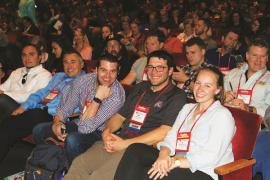Authors’ note: Based on a wide search of images on the web, we have chosen not to include photographs with this article in order to avoid furthering stereotypes or cultural appropriation.
Camp professionals are taking a greater interest in the concept of allyship, a process of unlearning and re-evaluating whereby those in positions of privilege attempt to adopt a stance of solidarity with marginalized groups of people (The Anti-Oppression Network, 2017). Many camps are steeped in an apparent homage to the indigenous peoples of North America, but as role models and leaders of youth, we must address and establish a reconciliation with these diverse indigenous cultures. This rethinking of the relationship between camps and indigenous peoples stems from recent concerns with camp programming that appropriates and homogenizes indigenous cultures. Yet, many camps have long and rich relationships with local indigenous communities and individuals. These camps seek to renew such relationships in respectful ways and, in doing so, support the wider goals of reconciliation and decolonization. In Canada, the release of the Truth and Reconciliation Commission’s Report into the history of residential schools for indigenous children has motivated actions around children’s programming, cross-cultural awareness, and reconciliation between indigenous and non-indigenous peoples (Truth and Reconciliation Commission of Canada, (2012).
In the United States, the context and issues are somewhat different. Change in public perceptions and attitudes are generally motivated by the statements and actions of elected officials and subsequent government legislation. The impetus toward the Truth and Reconciliation Commission on residential schools and the broader redressing of injustices to Canada’s indigenous communities stems from the official apology made by former Prime Minister Stephen Harper in 2008 (Government of Canada, 2008). A corresponding public statement from the White House for injustices to Native Americans has yet to take place. There is a certain irony here in that the establishment of Canada’s Indian Residential Schools was based on an American model, that of US Army Officer Richard H. Pratt, who was the founder of the Carlisle Indian School in 1879. The Carlisle School was the first of over 140 boarding schools for Native American youth across the US. Many of these boarding schools for Native Americans persisted well into the 1980s and early 1990s (Wikipedia, 2017).
Camp directors today are well aware of changing social norms and social justice issues in an increasingly regulatory environment. As a result, summer camps find themselves constantly challenged to engage in a process of self-reflectivity that often calls for the reevaluation of the content and delivery of programs that may be steeped in long-standing camp tradition. As an example, indigenous-inspired event days or associated programming should be based on 21st-century cultural understandings in concert with reflective practice, and not a habitual recycling of what is increasingly being viewed as inappropriate behaviors. However well-intentioned indigenous-inspired camp activities may seem, as youth leaders we do not want to be engaging in naive acts of cultural appropriation or the reinforcement of cultural stereotypes (Shore, 2015).
Contemporary camp programming should encourage an awareness of contemporary indigenous peoples and their traditional homelands as opposed to simply projecting an historical or idealistic bias that may perpetuate the idea that “Indians” exist only in the past. Current evidence-based research recognizes the powerful capacity of camp experience for contextual learning, enduring recollection, and learning transfer (Fine, 2005). As such, camps do not want to be sending out wrong messages.
Both the American Camp Association and the Canadian Camping Association, through their research endeavors and staff training, strive to achieve a culture of ongoing self-improvement based on a current understanding and respect for all cultures. Our intention with the annotated list of Indigenous Instructional Programming that follows is to build awareness of programs that can aid camp professionals seeking to build intercultural competency among staff groups and, by extension, work toward a larger goal of determining whether or not indigenous traditions still merit a place at camp. We hope to support your interests in learning about indigenous peoples and the issues facing indigenous and non-indigenous peoples regardless of your camp’s history. In doing so, the information provided here is a small part of trying to answer a question surrounding what we hear frequently: “How do we start to make changes?”
Many of the programs on this list encourage experiential learning. The Kairos Blanket Exercise and training provided by the Ontario Federation of Indian Friendship Centres both offer opportunities for role play as a way of experiencing intimately the history of colonialism and its effects on indigenous peoples. Other programs, like the San’yas Indigenous Cultural Safety Training and the offerings at Aboriginal Awareness Canada, are found online and designed for individual or small-group learning.
Several programs have been designed specifically as school curricula but are easily transferable to the camp setting. Native American sports, games, arts, and cooking are included within Lessons on Native Americans and are specific to tribal origins to avoid any overarching “pan-Indianism” or clumping together of diverse indigenous nations and cultures. Camp programming should reflect the reality that there are over 600 individual tribes and at least 56 language groups spanning North America from Mexico to the Arctic regions (Wikipedia, 2017).
This list is divided into US- and Canadian-based services, many of which are applicable to camps on either side of the US and Canadian borders. Each annotation describes briefly the format and content of the program, how it works, and its goals. The programs rarely have camp staff explicitly in mind and, yet, many are adaptable to a camp context. We emphasize programs that are directed at learning about the history of indigenous peoples and the development of relationships between indigenous and non-indigenous groups. These are programs that camp staff can take and, in many cases, can be brought to camp. Where we have taken the program, additional notes are provided. Please note that this list does not focus on training specifically designed for health care practitioners. In all cases, we encourage you to do your own research. We are not necessarily endorsing any specific program beyond promoting the idea that this kind of training may be useful to you or your camp staff.
Selected American Resources and Opportunities
Social Psychology Network/Understanding Prejudice
Teaching about Native American Issues
Camps that have a long-standing tradition of activities based on Native American themes or practices will find this guide useful for policy options and staff training. Presented as a simple checklist of dos and don’ts, it can assist camp administrators and staff to avoid passing on stereotypical, inaccurate, or outdated portrayals of Native Americans to campers.
Research has shown that a young person’s experiences while at camp have the potential to be enduring and transferable to their community, school, and later life. It is important that the lessons learned at camp teach respect for Native Americans as living people who still carry on past beliefs and practices.
University of Nebraska/Omaha
National Indian Youth Leadership Model: A Manual for Program Leaders
The National Indian Youth Leadership Model (NIYLM) was created to develop specific leadership skills in Native American youth. The underlying theme for this leadership model is “service leadership” drawn from both traditional Native American as well as contemporary sources. Service leadership can be defined as the pursuit of serving society and/or contributing to the well-being of others by way of positive self-concept and collaboration with others. The NIYLP model presents traditional values and customs common to the indigenous peoples of America, as well as non-indigenous, in the fields of positive youth development, psychology, technology, education, and other areas of life. The model gives examples of programming both familiar and novel to camp professionals. It is a worthwhile guide toward building a greater understanding for contemporary Native American camp programming that is readily transferable to the overall camp community.
National Indian School Board Association, Poison, MT
Creating a Sacred Place is a culturally relevant school curriculum for Native American children. The material within is written by both Native American and non-indigenous educators and can be adapted to camp programs and activities for younger campers. The approach taken within the curriculum promotes reading, language arts, math, and science based on Native American writings as well as non-indigenous books and topic areas. Of interest to camp programmers wanting to enhance Native American content is the section, “Example Activities Developed by Teachers of American Indian Students,” originally put forward by Haskell Indian Nations University.
Education World
Produced as an aid to developing classroom curriculum for non-indigenous students, Education World presents 12 activities to assist students in learning about Native American history and cultures. These activities, submitted by innovative educators from across the US, are readily transferable to a camp setting and include role play and drama, word games and codes, preparing traditional foods, art projects, and others.
American Indian Institute
Councils of the Traditional Circle of Indian Elders and Youth
This is a rich resource for camps that wish to explore a 21st-century understanding of the traditional culture practices of Native Americans and the role camp can play in educating non-indigenous youth. The American Indian Institute is a human resource based upon communities of nations, the teachings of elders, and interactions with them. The mission of the institute is to “perpetuate the ancient wisdom and cultural heritage of North America’s Native peoples, and to promote a greater understanding of that wisdom among all people.”
The institute serves as the administrative agency for the Traditional Circle of Indian Elders and Youth, an alliance of cultural and spiritual leaders from the Native American nations throughout North America. Camps interested in engaging with Native American elders within their geographic regions and contingent heritage lands should contact the institute for possible human resource recommendations.
Manataka American Indian Council
Camps wishing to maintain a connection with the Native American heritage related to their camp’s location can do so in a respectful manner through the implementation of Native American games and sports. Native American children play many different types of games for pleasure and athleticism, which are historically rooted in their benefits toward developing skills for hunting and basic survival. Children also learn teamwork and team building through games to augment their social development and life skills. Many of these sports and games are centuries old and are still played by many Native Americans.
The Manataka American Indian Council promotes the dissemination of traditional indigenous games and sports as a way of bringing together the youth of various tribal nations as well as increasing public awareness of Native American sport to non-indigenous youth. The Manataka website lists the games and sports of many native tribes from across North America along with the required equipment and how to play.
National Museum of the American Indian
Educator Programs and Workshops
Professional development opportunities through the National Museum of the American Indian (NMAI) can benefit camp directors seeking to incorporate new content about Native American culture, art, and history into camp programs. The museum is currently engaged in a national education initiative, “Native Knowledge 360°,” and provides workshops that focus on the development of essential understandings about Native Americans. The workshops address culturally sensitive ways to approach the study of diverse Native American cultures in the classroom but provide timely and relevant information that is transferable to outdoor settings. These events take place in Washington, DC, and New York and are free. The NMAI puts out a quarterly newsletter with information on these workshops.
Selected Canadian Opportunities
Kairos Canada
The Kairos Blanket Exercise is a popular activity for teaching groups of people about the history and legacy of colonialism in Canada. Fully experiential, participants are asked to take on the role of indigenous peoples and stand on blankets that represent land. As the exercise progresses, events in history are read aloud and facilitators remove blankets. By the end, most of the blankets are gone and most participants have been asked to step away from the exercise. In the end, participants learn about the events that serve to alienate indigenous peoples from their cultures.
The Blanket Exercise was developed in the 1990s by Kairos, an ecumenical program administered by the United Church of Canada. It takes about 90 minutes and often concludes with a talking circle. McIlwraith participated in this exercise with camp staff at a camp conference and found it to be powerful, emotional, and a rich opportunity to learn Canadian history in a novel way. It works particularly well in smaller groups, and a camp setting where staff work together would be perfect. It would lead to ongoing conversations throughout camp sessions. The Kairos Blanket Exercise website is full of additional resources.
Ontario Federation of Indian Friendship Centres
Indigenous Cultural Competency Training (ICCT)*
Indigenous Cultural Competency Training is offered by facilitators associated with the Ontario Federation of Indian Friendship Centres (OFIFC). The program includes a range of training activities over several cycles or sessions. Each cycle lasts a full day. There is no requirement to complete all workshops.
The initial training cycle emphasizes the history of Canada’s relationship with indigenous peoples. The ideas of allyship and informed relationships is stressed. McIlwraith participated in this first cycle and found it to be intense, emotional, and highly worthwhile. Material was presented in both classroom and experiential styles. “At completion, I understood better my place as a non-indigenous person interested in positive relationships with indigenous peoples and communities.” This programming is ideal for small camp staff groups and, particularly, older camp staff. Those who work with camps that are building relationships with indigenous partners are encouraged to investigate this programming.
Aboriginal Awareness Canada
Aboriginal Awareness Canada facilitates online and in-person workshops related to helping individuals and organizations move toward reconciliation. For camp professionals, a general introduction to indigenous peoples is available and takes about three hours online. That course is the prerequisite for more advanced training. More relevant to the camp community are workshops related to building relationships with indigenous communities. That said, these programs are particularly geared to groups that are involved in indigenous programming for indigenous or non-indigenous children or are looking for ways to become more involved in such activities.
Provincial Health Services Authority in British Columbia
San’yas Indigenous Cultural Safety Training
This online training program is offered for residents of British Columbia, Manitoba, and Ontario by the Provincial Health Services Authority. It is a facilitated program with a health and safety emphasis, but the core Indigenous Cultural Safety (ICS) program promotes a greater understanding of indigenous cultural diversity, proper terminology, and colonial history. The ICS is designed for nonhealth professionals and non-indigenous adult learners who work in fields like justice services, child and family services, and education. The work is self-paced and takes eight to ten hours over an eight-week period. Participants take the course in learning pods of 25 people.
Native Canadian Centre of Toronto
Indigenous Cultural Competency Training
This training is offered by the Native Canadian Centre of Toronto, an established charitable organization with a mission to empower Toronto’s indigenous community through culturally supportive programming. The Indigenous Cultural Competency Training serves organizations with an interest in enhancing their awareness of indigenous issues, the contributions of indigenous peoples, and the effects of colonial practices and events. The stated goal is the promotion of change within individuals, organizations, and workplaces through communication and dialogue. The program is based on modules where ideas are developed over time. Group sessions are available. The website is current and a video describes the programming.
Manitoba Indigenous Cultural Education Centre, Inc.
micec.com/programs_and_services
A Manitoba-specific program, and located in Winnipeg, the Manitoba Indigenous Cultural Education Centre (MICEC) is a nonprofit organization that promotes awareness and understanding of indigenous issues. The programs offered by MICEC are applicable to camp contexts. They include arts and crafts programming as well as presentations on important topics like residential schools and the impacts of colonization. Engagement with indigenous leaders is part of the programming. Camp professionals based in Manitoba are advised to contact MICEC directly to discuss particular needs and goals.
* McIlwraith has participated in these programs.
References
The Anti-Oppression Network. (2017). Allyship. Retrieved from https://theantioppressionnetwork.com/allyship/
Fine, S. M. (2005). Contextual learning within the residential outdoor experience. University of Toronto, Toronto, ON. Retrieved from researchgate.net/publication/242400954_Contextual_Learning_within_the_Residential_Outdoor_Experience_A_Case_Study_of_a_Summer_Camp_Community_in_Ontario
Government of Canada. (2008). Statement of apology to former students of Indian residential schools. Indigenous and Northern Affairs Canada. Retrieved from aadnc-aandc.gc.ca/eng/1100100015644/1100100015649
Shore, A. (2015). Notes on camp: A decolonizing strategy, NSCAD University, Halifax, Nova Scotia. Retrieved from ccamping.org/wp-content/uploads/2015/05/A.Shore-Notes-On-Camp.pdf
Truth and Reconciliation Commission of Canada. (2012). Truth and reconciliation commission of Canada: Calls to action. Retrieved from trc.ca/websites/trcinstitution/File/2015/Findings/Calls_to_Action_English2.pdf
Wikipedia. (2017). American Indian boarding schools. Retrieved from https://en.wikipedia.org/wiki/American_Indian_boarding_schools
Wikipedia. (2017). Classification of indigenous peoples of America. Retrieved from https://en.wikipedia.org/wiki/Classification_of_indigenous_peoples_of_the_Americas
Stephen Fine, PhD, is the founder and co-director of The Hollows Camp in Ontario, Canada; research chair for the Canadian Camping Association; and ex officio member of ACA’s Committee for the Advancement of Research and Evaluation.
Thomas (Tad) McIlwraith, PhD, is an assistant professor of anthropology at the University of Guelph in Guelph, Ontario, Canada. He sits on the Canadian Camping Association’s research committee.



